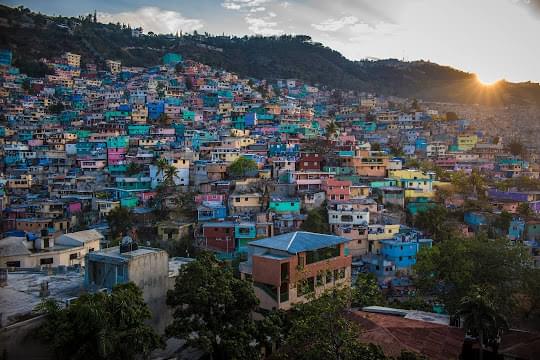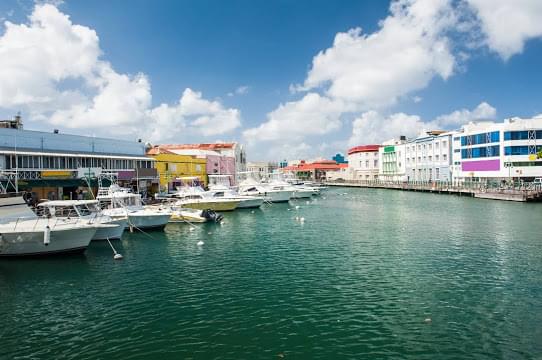200 Top visa openness country rankings

95
Palikir •
Oceania •
Micronesia •
Developing •
103K people
237
visa free
1
required

92
Port-au-Prince •
North America •
Caribbean •
Least Developed •
11M people
228
visa free
10
required

92
Kingstown •
North America •
Caribbean •
Developing •
110K people
227
visa free
11
required

90
Bridgetown •
North America •
Caribbean •
Developing •
285K people
220
visa free
18
required

88
Kuala Lumpur •
Asia •
South-Eastern Asia •
Developing •
31M people
204
visa free
31
online visa
3
required

87
Singapore •
Asia •
South-Eastern Asia •
Developed •
6M people
198
visa free
35
online visa
5
required

84
Hong Kong •
Asia •
Eastern Asia •
Developed •
7M people
184
visa free
49
online visa
4
required
1
banned

83
Manila •
Asia •
South-Eastern Asia •
Developing •
103M people
197
visa free
41
required
Top visa openness countries list - Visa Openness rankings in 2024
Last updated:
Top visa openness countries include Micronesia, Haiti, Saint Vincent and the Grenadines and Barbados. Cook Islands has easy visa entry for 238 countries. Find visa openness ranking across the world. See a visual map of visa openness rankings on the world map.
Visa openness definition and methodology
The Visa Openness Index is a comprehensive tool for measuring the visa policies of countries around the world.
Our methodology is designed to provide a rigorous and transparent assessment of visa openness, based on data from reliable sources.
To calculate the Visa Openness Index, we consider a variety of factors related to visa policies, including visa-free access, visa on arrival, and e-visa policies. We also take into account the restrictions and requirements that may apply to each category of visa.
The score for each country is calculated based on the number of visa types it offers, and the number of countries its citizens can travel to without a visa or with a visa on arrival. Our scoring system is designed to provide a comprehensive view of visa openness, with a maximum score of 100. Countries with high scores are considered to be more visa-open, while those with lower scores are considered to be less open. The data used to calculate the Visa Openness Index comes from reliable sources, including the International Air Transport Association (IATA), the United Nations World Tourism Organization (UNWTO), and the World Economic Forum (WEF). Our team of experts has analyzed the data and methodology used to create the index to provide you with the most comprehensive information available. Whether you're a frequent traveler or simply curious about the world, we're confident that our guide to the Visa Openness Index in 2024 will be an invaluable resource.
The score for each country is calculated based on the number of visa types it offers, and the number of countries its citizens can travel to without a visa or with a visa on arrival. Our scoring system is designed to provide a comprehensive view of visa openness, with a maximum score of 100. Countries with high scores are considered to be more visa-open, while those with lower scores are considered to be less open. The data used to calculate the Visa Openness Index comes from reliable sources, including the International Air Transport Association (IATA), the United Nations World Tourism Organization (UNWTO), and the World Economic Forum (WEF). Our team of experts has analyzed the data and methodology used to create the index to provide you with the most comprehensive information available. Whether you're a frequent traveler or simply curious about the world, we're confident that our guide to the Visa Openness Index in 2024 will be an invaluable resource.
Benefits of Visa Openness
Visa openness refers to the ease with which travelers can enter a country without a visa or with a visa on arrival. The Visa Openness Index 2024 ranks countries based on their visa policies and provides valuable insights into the benefits of visa openness for countries and travelers.
Here are some of the key benefits of visa openness:
- Economic benefits: Countries with more open visa policies tend to attract more international visitors, which can have a significant positive impact on their economies. This is because travelers bring in foreign currency, create jobs in the tourism industry, and stimulate growth in other sectors of the economy.
- Cultural exchange: Visa openness also promotes cultural exchange between countries, as it allows people from different parts of the world to travel more easily and experience different cultures. This can help to break down cultural barriers and promote understanding and tolerance between nations.
- Improved diplomacy: Visa openness can also contribute to improved diplomatic relations between countries. By making it easier for citizens to travel between countries, visa policies can help to foster closer ties and promote cooperation in areas such as trade, security, and education.
- Enhanced tourism: Visa openness is also beneficial for the tourism industry. It allows tourists to travel more easily and cheaply, which can increase the number of visitors to a country and boost the tourism industry's revenue. This can lead to the development of new tourist infrastructure and services, which can benefit both visitors and locals.
Practical implications of Visa Openness
The Visa Openness Index 2024 is a valuable tool for understanding the visa policies of different countries and their implications for travelers and countries. Here are some of the practical implications:
- Travel planning: For travelers, the Visa Openness Index 2024 can be a useful resource for planning trips to different countries. By understanding a country's visa policies, travelers can determine whether they need to obtain a visa in advance or if they can obtain a visa on arrival. This information can help travelers avoid unnecessary delays or complications during their trips.
- Business opportunities: AFor businesses, the Visa Openness Index 2024 can be a useful resource for identifying new markets and potential business opportunities. By understanding a country's visa policies, businesses can determine whether it is feasible to expand their operations to that country. This information can also help businesses to plan for the logistics of sending employees to work in other countries.
- Government policy: For governments, the Visa Openness Index 2024 can be a useful tool for evaluating the effectiveness of their visa policies and identifying areas for improvement. By analyzing the rankings of different countries, governments can determine whether their visa policies are competitive and attractive to foreign visitors. This information can also help governments to adjust their visa policies to better align with their economic and diplomatic goals.
- International relations: For countries, the Visa Openness Index 2024 can have important implications for their international relations. By adopting more open visa policies, countries can improve their standing in the global community and promote closer ties with other nations. Conversely, countries with more restrictive visa policies may face increased isolation and reduced opportunities for international cooperation.